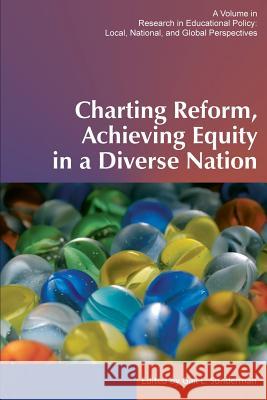Charting Reform, Achieving Equity in a Diverse Nation » książka
Charting Reform, Achieving Equity in a Diverse Nation
ISBN-13: 9781623962715 / Angielski / Miękka / 2013 / 290 str.
Charting Reform, Achieving Equity in a Diverse Nation
ISBN-13: 9781623962715 / Angielski / Miękka / 2013 / 290 str.
(netto: 220,50 VAT: 5%)
Najniższa cena z 30 dni: 229,16
ok. 30 dni roboczych.
Darmowa dostawa!
This book examines what equity means in a nation where the schools are becoming more diverse. The authors consider how well our educational reform policies, often framed in the language of equity and opportunity, measure up to the challenges of achieving equity in a diverse nation. While there is growing awareness of the increasing racial, ethnic, and socioeconomic diversity of the nation, there is little recognition of how these trends affect the schools, particularly in formerly homogeneous communities. At the same time, inequalities in student achievement between different racial, ethnic, and socioeconomic groups persist, even as educational policy has intensified the focus on the achievement gap. These two challenges make definitions of equity and opportunity as urban problems obsolete and call for a critical examination of educational policy and reform from an equity perspective. Central themes include the critical examination of how equity is conceived under the law and in policy, the experiences of minority students in suburban schools, and the impact of current reform policies and strategies for achieving greater educational opportunities for all students. This book is designed for graduate and undergraduate courses in educational policy and policy analysis, for policymakers interested in a critical examination of current reform policies and options, and educational leaders and administrators struggling with the implementation of reform mandates. From a policy perspective, it includes a survey of the evolution of educational policies and reforms since the 1960s and traces the mix of legal and legislative legacies that have informed educational policy and equity. It describes how trends in suburban diversification affect the schools, something that has largely escaped the attention of educational reformers. It provides school-based and non-school-based remedies for achieving equity in diversifying suburban communities and articulates alternatives to the current accountability for performance approach. It offers new and innovative analyses of current approaches to school reform, including an analysis of how accountability tests can create the illusion of reducing the achievement gap and an examination of the paradoxes of federally funded compensatory policies that incorporate market-based strategies. Novel approaches-such as social emotional learning and placed-based college access strategies-are examined through an equity lens.











